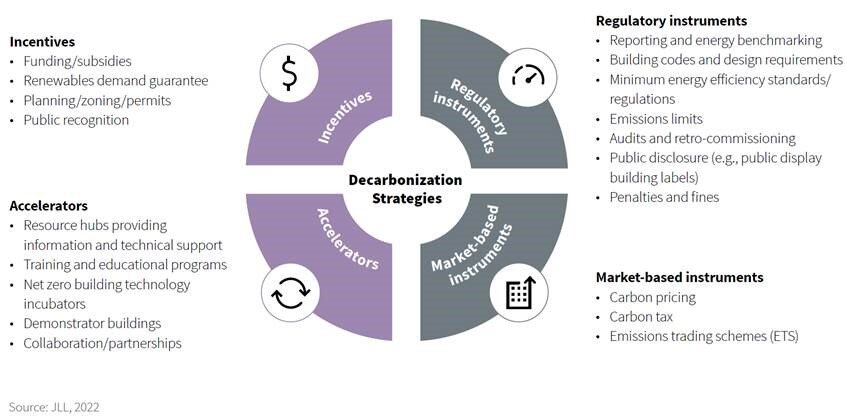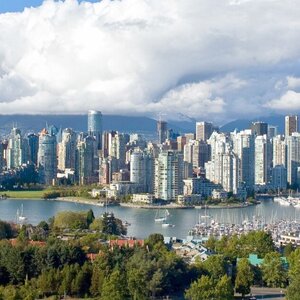Commercial Real Estate News

85 Percent of Hong Kong Buildings Require Extensive Retrofitting to Reach Decarburization Goals
Commercial News » Hong Kong Edition | By Michael Gerrity | May 31, 2022 8:46 AM ET
A recent study by JLL of 32 global urban centres revealed that the real estate sector accounts for an average 60% of overall carbon emissions, exceeding the World Green Building Council's current estimates of 40%. Hong Kong's real estate sector accounts for 60% of overall carbon emissions and the majority of its building stock is not efficient enough to comply with future carbon reduction targets.
Yet, JLL's latest report - titled "Decarbonising Cities and Real Estate" - finds that there is a significant gap between the policies enacted in cities, the impact of the real estate industry, and the climate science that indicates the need for swift action to limit global warming.
According to the research, city governments are setting ambitious sustainability targets, often well ahead of national goals. In Asia Pacific for example, cities like Sydney and Shanghai are aiming to achieve a 70% and 65% reduction of carbon emissions respectively by 2030. However, plans to tackle the carbon emissions from buildings are frequently given insufficient attention - with some cities such as Hong Kong, Shanghai and Mumbai lacking concrete targets to deliver net-zero carbon buildings.
To deliver a holistic and effective decarbonisation plan for buildings, JLL's report emphasised that partnerships with landlords, investors, developers, and occupiers are paramount.
"Buildings are both the problem and the solution for our climate crisis, and partnerships between the private and public sector are critical to driving tangible progress in decarbonizing the economy. For Asia Pacific, this is especially important in cities like Hong Kong, where 85% of buildings are over 10 years old and extensive retrofitting is required of existing building stock. Yet no targets have been set to decarbonize buildings," said Kamya Miglani, Head of ESG Research, Asia Pacific, JLL. "If this doesn't happen, we can expect local governments to introduce heavy regulation and penalties on building standards - there will be winners and losers as cities race to net zero carbon."
Helen Amos, Head of Sustainability at JLL in Hong Kong, said: "Even with a current rate of between 300 and 500 new buildings under construction in Hong Kong each year, between 60% and 80% of the buildings that will be in existence in 2050 are already standing. The buildings are not efficient enough to comply with future carbon reduction targets. Retrofitting the existing building stock to net-zero carbon is central to decarbonizing a city's economy. Given that Hong Kong is slow to implement strict standards on new builds, the city should accelerate the pace of retrofitting rate to over 3.5% per year. The longer the city delays in taking action, the more formidable the scale of the challenge in the future."
JLL's research identified that the cities most likely to be successful in advancing decarbonisation will be those that balance regulation, incentives, innovation and accelerators. Several cities were called out for their innovative approaches to reduce emissions from buildings, such as Singapore's Green Building Masterplan which targets to green 80% of buildings by 2030. Meanwhile, Tokyo has in place a cap-and-trade programme, which incentivises building owners to reduce emissions and use renewable power.
However, the study also warned that policy and regulations across the globe are lagging behind the science today, and this puts a greater onus on the private sector to take the lead in climate action. This is especially pertinent for Asian cities like Shanghai, Hong Kong, and Mumbai, which stand out in terms of climate vulnerability and are under the greatest pressure to improve resilience against heat, drought, fire and precipitation.
Time to act is now
Rather than waiting for regulations to kick in before taking action, building owners, investors and occupiers are encouraged to act now to develop more resilient assets and create a competitive advantage. This involves doubling down on energy efficiency initiatives and exploring onsite and offsite renewables - which in turn requires city governments to move in lockstep and provide green local energy grids. Knowledge sharing and accelerator programmes will also play a pivotal role in facilitating the retrofitting of existing buildings, particularly for small owners and occupiers.
Beyond carbon, JLL's research highlighted that cities must go beyond decarbonising the built environment to consider regeneration, circularity and resilience. This involves embracing the circular economy to eliminate waste and investing in urban greening and biodiversity to develop sustainable, healthy and liveable cities.
Sign Up Free | The WPJ Weekly Newsletter
Relevant real estate news.
Actionable market intelligence.
Right to your inbox every week.
Real Estate Listings Showcase
Related News Stories
Commercial Real Estate Headlines
- One Trillion Dollars of America's Commercial Property Loans Mature in 2025
- U.S. West Coast Dominates Self Storage Demand
- Phoenix, Orange County and Inland Empire Emerge as Leading U.S. Industrial Markets
- U.S. Mega Distribution Centers Leasing Activity Grew in 2024
- U.S. Commercial Borrowing to Increase to $583 Billion in 2025, Up 16 Percent Annually
- Demand for U.S. Life Sciences Space Spikes 28 Percent Annually in Late 2024
- Multifamily Property Sector in America Rebounding
- Asia Pacific Commercial Property Investment Spikes 23 Percent in 2024
- U.S. Commercial Property Market Primed for Growth in 2025
- Architecture Industry Sees Mixed Signals as 2025 Approaches
- Global Data Center Demand Spikes in 2025
- 2025 Prediction: U.S. Commercial Investment Recovery Expected to Gain Traction
- Holiday Retail Sales for 2024 to Hit Record $1 Trillion
- Tech, AI Industries Drive Largest Share of Office Leasing Activity in U.S.
- Commercial Real Estate Lending in U.S. Enjoys Strong Growth in Q3
- U.S. Multifamily Market Begins Recovery in Q3
- Commercial Investment in Japan Spikes 24 Percent Annually in Q3
- Despite Return-to-Office Mandates, U.S. Office Vacancies Continue to Rise
- PROPSIG Tech Startup Acquired by World Property Data
- U.S. Commercial Mortgage Debt Hits $4.7 Trillion in Q2 as Delinquencies Increase
- Hong Kong Class A Office Rents Continue to Downtick in Mid-Summer
- U.S. Office Landlords Tenant Concessions Decline for First Time in 4 Years
- U.S. Commercial Mortgage Originations Spike 27 Percent in Q2 Over Q1
- Phnom Penh's Commercial Office, Retail Markets Face Slowdowns in 2024
- Global Edge Data Center Market to Hit $300 Billion by 2026
- Commercial Property Transactions in Japan Dive 25 Percent Annually in Q2
- Delinquency Rates for U.S. Commercial Property Loans Downticks in Q2
- Megawarehouse Lease Deals in U.S. Increase in 2024
- Office Tenants' Flight to Quality Buildings Increases in 2024
- Commercial Lending in Japan Upticks 6 Percent Annually in Q1
- AI Driving Significant Global Data Center Growth in 2024
- Total U.S. Commercial Mortgage Debt Rises to $4.7 Trillion in Q1
- U.S. Commercial Mortgage Delinquencies Rise in Early 2024
- Asia Pacific Office Sector to Further Reprice Throughout 2024
- U.S. Retail Foot Traffic to Surpass Pre-Pandemic Levels by 2025
- Commercial Real Estate Lending in U.S. Slowed in First Quarter
- Japan Commercial Property Investment Volume Jumps 7 Percent in Q1
- Asia Pacific Commercial Property Investment Leads the World, Spikes 13 Percent
- Driven by High Rates, U.S. Commercial Lending Imploded 47 Percent in 2023
- After Two Year Slump, Prime Multifamily Metrics Uptick in U.S.






